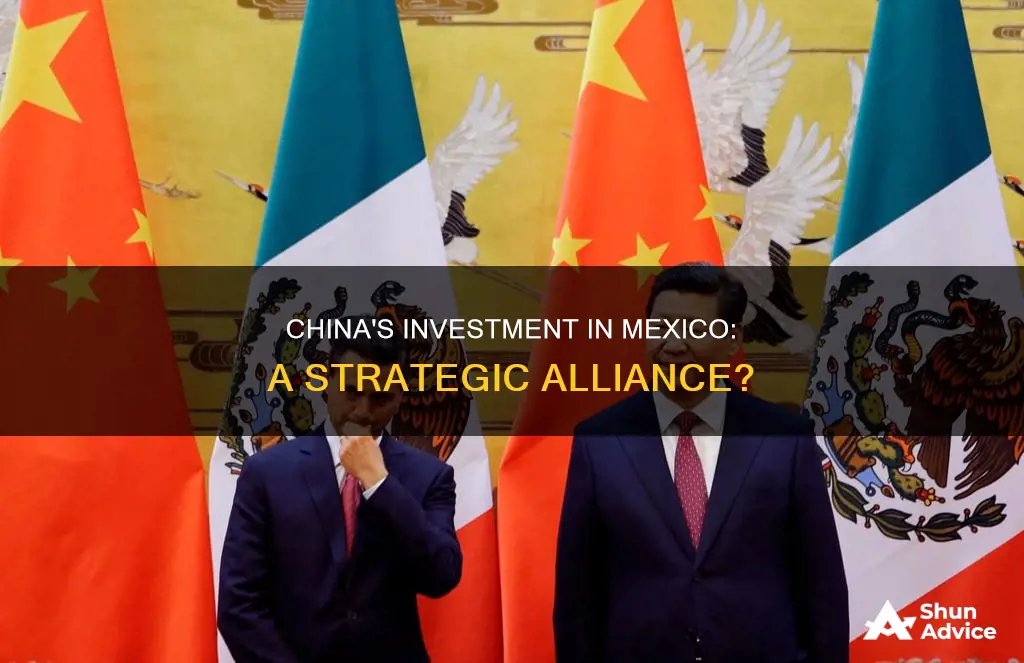
China has been investing billions in Mexico in recent years, with companies taking advantage of an expansive North American trade deal. This move is part of a broader trend known as nearshoring, where international companies move production closer to customers to limit their vulnerability to shipping problems and geopolitical tensions.
The main appeal of Mexico is its proximity to the US market, allowing Chinese companies to label their goods Made in Mexico and truck them into the US duty-free. Other factors include Mexico's relatively inexpensive labour force, high urbanisation rate, and growing middle class.
However, companies may face challenges such as language barriers, cultural differences, and labour groups when investing in Mexico.
| Characteristics | Values |
|---|---|
| Reason for investment | To avoid tariff entanglements and geopolitical disruptions to the supply chain |
| Investment type | Foreign direct investment (FDI) |
| Investment amount | $587.2 million in 2022 |
| Investment location | Nuevo Leon, Mexico City, Chihuahua, and Monterrey |
| Industries | Automotive, computer equipment manufacturing, battery manufacturing, energy, telecommunications |
| Companies | Man Wah Furniture Manufacturing, Lenovo, Lingong Heavy Machinery Co., Huawei, Hisense, Contemporary Amperex Technology |
What You'll Learn

China's investment in Mexico's energy sector
China has been investing in Mexico's energy sector for almost a decade. In 2014, Mexico and China signed 14 cooperation agreements that would see up to $14 billion in investment in Mexico's energy, mining, infrastructure, telecom, and tourism sectors. As part of these agreements, the two countries set up a $2.4 billion binational investment fund for energy, mining, infrastructure, technology, and tourism, with the potential to grow to $9 billion. The Sino-Mex Energy Fund, a $5 billion energy and infrastructure investment fund set up by Mexico's NOC Pemex and Chinese state-owned firms, was also launched.
In 2020, the Chinese Development Bank announced a $600 million investment for the construction of the Dos Bocas oil refinery in Mexico, which would be the country's largest state-controlled refinery. That same year, Chinese direct investment in Mexico doubled compared to 2017, reaching a peak of $587.2 million in 2022.
While China's investment in Mexico has spanned multiple sectors, the energy sector has been a key focus. Mexico possesses valuable energy resources, including excellent solar and wind resources that make it an attractive destination for investment in renewable energy technologies. Chinese companies recognize the potential for growth in Mexico's energy sector and are investing in solar and wind energy projects, as well as electromobility solutions.
Zuma Energía, a subsidiary of the Chinese state-owned State Power Investment Corporation (SPIC), has invested over $1 billion in Mexico and continues to expand its businesses in the country. Zuma Energía's portfolio includes significant renewable energy capacity and strategic investments, supporting Mexico's economic growth and environmental goals. The company aims to increase its installed capacity from 1.1GW to 5GW by 2030.
The Investiture Question: When Will Prince William Receive His Official Title?
You may want to see also

China's investment in Mexico's automotive industry
Chinas investment in Mexicos automotive industry
A Diversification of Investments
Since 2010, there has been a growing diversification of Chinese investments in Mexico towards activities such as electricity, transport infrastructure construction, manufacturing, finance, and information and communication technologies. Chinese direct investors in Mexico are predominantly private companies that enter through new projects aimed at the auto parts and automotive industry.
A Growing Market Share for Chinese Cars in Mexico
Chinese car sales in Mexico have been steadily increasing. In 2023, Chinese brands accounted for 19.4% of overall car sales in the country, up from 6.5% in 2022. This growth is driven by competitive pricing, with Chinese vehicles being, on average, 36% to 50% more affordable than their competitors.
US Concerns
The growth of China's automotive sector in Mexico has raised concerns in the US, particularly as Mexico is the second-largest importer of Chinese cars after Russia. There are worries that China is preparing to flood the US market with automobiles, particularly electric vehicles (EVs), supported by massive subsidies and discriminatory policies. This has led to increased trade tensions between the two countries.
US-Mexico Trade Relations
The United States-Mexico-Canada Agreement (USMCA) requires automotive companies to have 75% of their components manufactured in Mexico, the US, or Canada to qualify for total tariff exemption. This has been a point of contention, as it provides an opportunity for Chinese automakers to access the US market without paying tariffs.
Chinese Investments in Nuevo Leon
There has been a notable shift in Chinese investment towards the US border state of Nuevo Leon, with inflows of Chinese direct investment into the state reaching 48.3% of net inflows to Mexico in 2023. Monterrey, the capital of Nuevo Leon, is home to factories for many multinational companies, including Tesla Inc.
Tax Cut Strategies: Investments to Prosper Under Republican Tax Laws
You may want to see also

China's investment in Mexico's computer equipment manufacturing
Mexico's proximity to the United States, its free trade agreements, and its relatively low wages make it an attractive destination for foreign investment. Chinese companies can establish factories in Mexico, label their products as "Made in Mexico," and then truck their goods into the United States duty-free under the US-Mexico-Canada Agreement (USMCA). This allows Chinese companies to avoid tariffs imposed on imports from China while still accessing the large and lucrative US market.
Lenovo, a Chinese computer maker, has been at the forefront of this trend. The company has a factory in Monterrey, Mexico, where it assembles servers that sell for up to $1 million each. Lenovo's investment in Mexico began in 2007 with an initial investment of $20 million, and the company has since expanded its operations in the country.
In addition to Lenovo, other Chinese companies have also invested in Mexico's computer equipment manufacturing sector. For example, in 2022, China's total outbound direct investment grew by 11.4% to US$130.1 billion, with Latin America being a major destination for these investments. Mexico, with its large and young demographic, is an attractive market for Chinese products. Chinese cars, for instance, represented 19.5% of the Mexican domestic market in early 2023, a significant increase from 2018.
While China's investment in Mexico's computer equipment manufacturing is significant, it is important to note that it represents only a small portion of Mexico's overall foreign direct investment (FDI). China's FDI in Mexico has grown from $38 million in 2011 to $282 million in 2022, but it still accounts for only about 1% of the country's total FDI. However, China is the fastest-growing source of foreign investment in Mexico, and its investments in the computer equipment manufacturing sector are expected to continue driving this growth.
Ford: A Smart Investment Move
You may want to see also

China's investment in Mexico's battery exports
In recent years, China's exports of battery components, particularly lithium batteries used in electric vehicles (EVs), to Mexico have increased significantly. Between 2018 and 2023, China's battery exports to Mexico rose consistently, with a 35% increase in 2018, followed by 32% in 2021 and an 11% increase in 2022. While there was a 6% drop in 2023, China's investment in Mexico's battery industry remains significant.
One of the key drivers of China's investment in Mexico's battery exports is the country's growing automotive industry. Mexico is the seventh-largest auto-producing country globally, and its preferential tariff status in the North American market makes it an attractive destination for Chinese automakers. Chinese car sales in Mexico have seen a substantial increase, accounting for nearly 20% of total sales in 2023, up from virtually zero six years ago.
In addition to the automotive industry, Mexico is also attracting investment from Chinese battery manufacturers. In 2022, it was reported that the world's largest battery maker, CATL, was considering opening new plants in the United States and Mexico. However, with the Inflation Reduction Act's new restrictions on EV battery materials, CATL has slowed down its plans. Despite this, China continues to dominate the EV battery supply chain, producing about 70% of battery cells globally.
Mexico's proximity to the United States, its large market, and its relatively lower labour costs make it an ideal location for Chinese companies to establish manufacturing bases. This trend, known as "nearshoring," allows Chinese companies to label their goods as "Made in Mexico" and provides them with duty-free access to the US market. The Hofusan Industrial Park, located near Monterrey, is a prime example of this trend, hosting manufacturing plants for ten Chinese companies with a total investment of $1 billion over the past three years.
In conclusion, China's investment in Mexico's battery exports is a strategic move driven by the country's proximity to the US market, favourable trade agreements, and lower labour costs. Mexico's growing automotive industry and its position as a top exporter of goods to the US make it an attractive destination for Chinese battery and automotive manufacturers. However, increasing Chinese influence in Mexico has also raised concerns among US lawmakers, leading to potential trade restrictions and increased scrutiny of Chinese investments in the country.
Invest Now or Later?
You may want to see also

China's investment in Mexico's telecommunications
China has been investing in Mexico's telecommunications infrastructure in recent years, with Chinese companies continuing to invest in strategically important sectors, including telecommunications. In 2014, China offered to fund Mexico's plans to build telecommunications networks to service rural areas. Huawei was expected to supply equipment under cheap loans to fund Mexico City's $750 million plan to extend phone links to rural areas.
In 2017, Huawei landed a contract to provide equipment for Mexico's communications network but was blocked from supporting the system's core and sites near the US border. However, in 2018, Huawei began working on three tech infrastructure projects in three northern Mexican cities, raising concerns about the proximity of its equipment to the US border. Huawei has been sanctioned by the US government, and there are concerns about the potential for abuse of technology in countries where it is implemented.
In addition to Huawei, other Chinese telecom companies have a presence in Mexico, including the Chinese telecoms giant Huawei Technologies and the China Communications Construction Company (CCCC). The CCCC was blacklisted by the World Bank in 2011 for fraudulent practices and has been involved in several irregularities in its projects throughout the region.
Chinese investment in Mexico's telecommunications sector is part of a broader trend of Chinese companies investing in Mexico to take advantage of its proximity to the US market and favourable trade deals. China is now Mexico's second-largest trading partner, and Mexican imports from China have steadily increased since 1999, with nearly $70 billion in imports in 2015. Chinese companies are also attracted to Mexico's relatively inexpensive labour force, high urbanisation rate, and growing middle class.
While access to the US market remains the primary motivator for most Chinese investors, the Mexican market offers an "insurance policy" due to its rising middle class. Chinese cars represented 19.5% of the Mexican domestic market in 2022, a 5.8% increase from 2018.
Planning for the Golden Years: Navigating the World of Retirement Investing
You may want to see also
Frequently asked questions
Chinese companies are investing in Mexico to avoid tariff entanglements and geopolitical disruptions to the supply chain. Mexico also offers a relatively inexpensive labour force, high urbanisation, and a growing middle class.
China has invested billions of dollars in Mexico in recent years. In 2022, foreign direct investment (FDI) from China to Mexico was approximately $296.5 million, making it the second-highest FDI from China in a North American country during that period.
Chinese companies invest in strategically important sectors in Mexico, including energy, telecommunications, automotive, and computer equipment manufacturing.
China's investment boosts Mexico's economic growth through job creation, incentives for human capital development, and technology transfers. It also helps to integrate production across North America, increasing international competitiveness.
China's investment in Mexico can provide significant stimulus to U.S. employment and exports. It may also help to reduce undocumented immigration to the United States by creating new jobs for Mexican workers.







